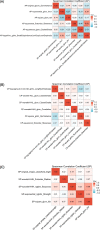Automated breast volume scanner based Radiomics for non-invasively prediction of lymphovascular invasion status in breast cancer
- PMID: 37648970
- PMCID: PMC10466688
- DOI: 10.1186/s12885-023-11336-w
Automated breast volume scanner based Radiomics for non-invasively prediction of lymphovascular invasion status in breast cancer
Abstract
Purpose: Lymphovascular invasion (LVI) indicates resistance to preoperative adjuvant chemotherapy and a poor prognosis and can only be diagnosed by postoperative pathological examinations in breast cancer. Thus, a technique for preoperative diagnosis of LVI is urgently needed. We aim to explore the ability of an automated breast volume scanner (ABVS)-based radiomics model to noninvasively predict the LVI status in breast cancer.
Methods: We conducted a retrospective analysis of data from 335 patients diagnosed with T1-3 breast cancer between October 2019 and September 2022. The patients were divided into training cohort and validation cohort with a ratio of 7:3. For each patient, 5901 radiomics features were extracted from ABVS images. Feature selection was performed using LASSO method. We created machine learning models for different feature sets with support vector machine algorithm to predict LVI. And significant clinicopathologic factors were identified by univariate and multivariate logistic regression to combine with three radiomics signatures as to develop a fusion model.
Results: The three SVM-based prediction models, demonstrated relatively high efficacy in identifying LVI of breast cancer, with AUCs of 79.00%, 80.00% and 79.40% and an accuracy of 71.00%, 80.00% and 75.00% in the validation cohort for AP, SP and CP plane image. The fusion model achieved the highest AUC of 87.90% and an accuracy of 85.00% in the validation cohort.
Conclusions: The combination of radiomics features from ABVS images and an SVM prediction model showed promising performance for preoperative noninvasive prediction of LVI in breast cancer.
Keywords: Automated breast volume scanner; Breast cancer; Lymphovascular; Radiomics model.
© 2023. BioMed Central Ltd., part of Springer Nature.
Conflict of interest statement
The authors declare no competing interests.
Figures





References
MeSH terms
Substances
LinkOut - more resources
Full Text Sources
Medical
Miscellaneous

